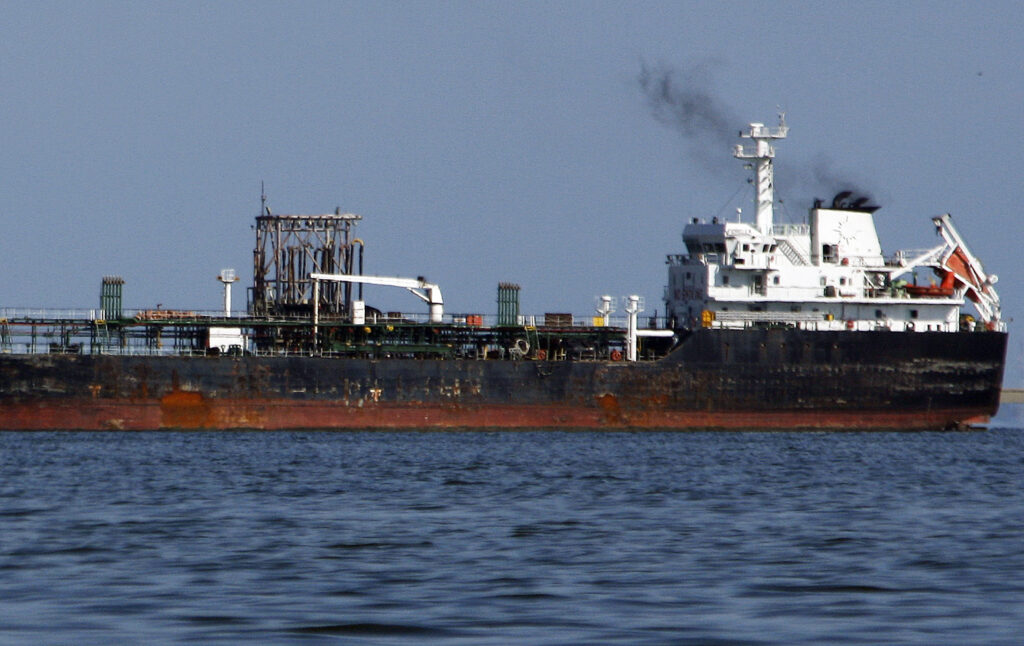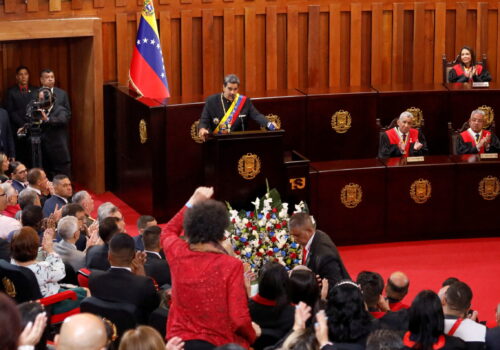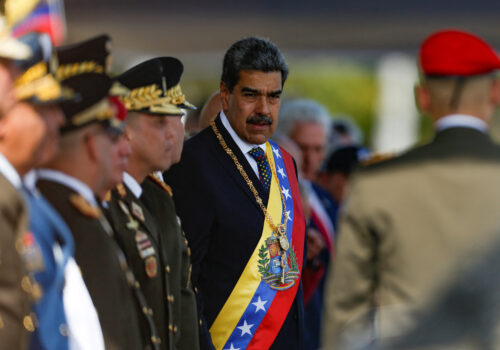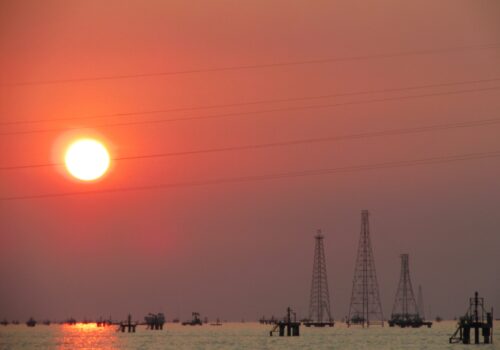What does an “America first” approach to Venezuela look like? The world may be about to find out. On March 24, US President Donald Trump issued an executive order empowering Secretary of State Marco Rubio to impose a 25 percent tariff on goods from any country that imports Venezuelan oil and gas, framing the measure as retribution for high levels of outbound migration from Venezuela and the country’s hostility to US interests.
As with any recent tariff announcement by Trump, the devil is in the details. Venezuela currently exports oil and gas to a variety of countries, ranging from US rivals such as China and Russia to US allies such as India, Spain, France, and a number of small Caribbean nations. Is Trump interested in slapping an additional 25 percent tariff on Chinese goods sold in the United States, on top of the current 20 percent tariffs? Is he willing to impose tariffs on US allies? And are any of these countries willing to risk those tariffs in order to continue receiving Venezuelan crude oil and gas? All of this remains unclear.
What is clear is that, at the same time that Trump is seeking to box out foreign companies, he is preserving space for US companies to operate in Venezuela’s oil sector. Just hours after the president announced the tariff plan, the US Treasury Department announced that it had extended the “wind down” period it had previously given Chevron to pull out of Venezuela. Instead of the original deadline of April 3, the US oil major now has until May 27 to end its operations. But the fact that the Treasury’s Office of Foreign Assets Control (OFAC) extended this license, coupled with the reality that previous OFAC licenses that have been framed as “wind down” notices (like the limited General License 8) have been renewed consistently since 2019, suggests this wind down could evolve into a more permanent arrangement. This license has so far only permitted restricted activities, but other licenses allowing European and other companies to operate have so far remained in place. It is too early to be certain, but there is a chance that Chevron may be allowed to continue to operate in Venezuela, but on a tighter leash.
Such an approach would fit with Trump’s “America first” agenda. So far, US sanctions on Venezuela’s oil sector have done nothing to dislodge Venezuelan strongman Nicolás Maduro from the presidential palace in Caracas and may have actually pushed Venezuela further into the orbit of US global rivals. Until Chevron was given a green light to deepen its operations in Venezuela in 2022, oil sanctions created an opening for China and Iran to emerge as Venezuela’s primary trading partners. Iranian traders received Venezuelan oil in exchange for condensate, which Venezuela’s state-owned oil company then mixed with its extra-heavy crude in order to sell it on the global market at steep discounts, largely to Chinese firms. Russian firms, meanwhile, have maintained limited but important investments in the country’s oil sector even in the face of secondary sanctions. Essentially, US sanctions were subsidizing cheap oil for China and preserving undue influence to Russian investors—all to the detriment of US interests.
As for US allies and partners such as Spain, France, Italy, and India, there is likely no need for the administration to escalate matters by imposing tariffs. Instead, OFAC could simply end specific licenses and comfort letters, which provide specific guidance allowing certain companies to operate. Of course, doing so might compound the problem further by creating an opportunity for US rivals to step back in and exert their influence, especially if US energy firms are also instructed to pull out of Venezuela. If that happens, expect an increase in Chinese, Russian, and Iranian influence over Caracas. China has made clear that Venezuela is an “all-weather strategic partner” of Beijing and is unfazed by the threat of tariffs. Instead of signaling its compliance with the new executive order, the Chinese Foreign Ministry has issued a statement rejecting US influence in Venezuela and asserting that the tariffs would only hurt US consumers. Venezuelan oil is expected to continue to flow to China’s market, even in spite of a current slowdown caused by the uncertain climate.
Trump and his cabinet are almost certainly aware of this risk. They understand that it is not in the US interest to simply sit back and watch Venezuela, the country with the largest oil reserves on the planet, drift further into the arms of Russian President Vladimir Putin and Chinese President Xi Jinping. This is likely why, in spite of the recent rhetoric, the White House sent Presidential Envoy for Special Missions Richard Grenell to Caracas in February to begin conversations with the Maduro government. Grenell’s work has so far secured the release of six American hostages and convinced Maduro to accept repatriation flights of Venezuelan deportees.
Ultimately, the White House seems to be advancing an approach that Trump knows well: making a deal. With conversations ongoing and the door left open to Chevron and other US companies to continue operating in Venezuela, even if foreign companies are forced out, the administration seems to be preserving space for an agreement. An attractive deal might include concessions on migration, such as an acceleration in repatriation flights to match the administration’s interest in increasing deportations. It could also see some concessions on oil, such as the passage of legal reforms allowing US companies to assume majority ownership of joint ventures with the state oil company. But it should also include concessions that could move Venezuela toward a gradual democratic opening. After all, offering sanctions relief to shape internal incentives in Maduro’s inner circle is precisely what drove the government to organize, and to ultimately lose, last July’s presidential election.
There is a slim, but counterintuitive, opportunity in the fact that Maduro has said he will promote reforms to Venezuela’s 1999 constitution. Of course, Maduro is unlikely to agree to anything that will threaten his control in the immediate term, and he probably sees constitutional reform as a way to further entrench his power. But if Washington is open to expanding a US footprint in Venezuela’s energy sector, that gives US policymakers significant leverage as the ruling party debates any reforms. The United States should use this leverage to advance its oil and migration interests. But Washington should also seek verifiable progress on benchmarks such as the release of political prisoners, an end to the persecution of opposition activists, competitive electoral conditions, and perhaps a roadmap toward power-sharing and restoring the country’s democratic institutions.
Geoff Ramsey is a senior fellow at the Adrienne Arsht Latin America Center.
Further reading
Mon, Mar 3, 2025
Venezuela sanctions tracker: Who is the international community sanctioning in Venezuela?
Trackers and Data Visualizations By Lucie Kneip, Geoff Ramsey
International actors including the US, Canada, and the EU have imposed sanctions on individuals responsible for acts of corruption, human rights violations, and the breakdown of democratic rule in Venezuela. How aligned are these countries on sanctions, and where do gaps exist?
Fri, Jan 10, 2025
What the world can do about Maduro
Fast Thinking By
As the Venezuelan autocrat is inaugurated for a third term as president, our experts analyze what the United States, the region, and the opposition can do.
Tue, Dec 3, 2024
There’s a more effective way forward than “maximum pressure” for Venezuela
EnergySource By
Following the fraudulent outcome of Venezuela's July election, there is growing pressure on the United States to reintroduce sanctions to expel Western firms from the nation’s oil sector. However, preserving the existing policy, which restricts the regime’s financial access while promoting energy security and countering foreign influence, might prove more effective.
Image: Two oil tankers, the Kerala and Fiorella, load crude oil at the Bajo Grande Refinery facilities, on Lake Maracaibo today, Thursday, January 5, 2023, in Zulia, Venezuela. finery, Mississippi in the United States. The shipment of these vessels is given. after the US authorization to Chevron, through the General License of Venezuela (GL) 41, valid for six months. Photo by Humberto Matheus/Sipa USA.



